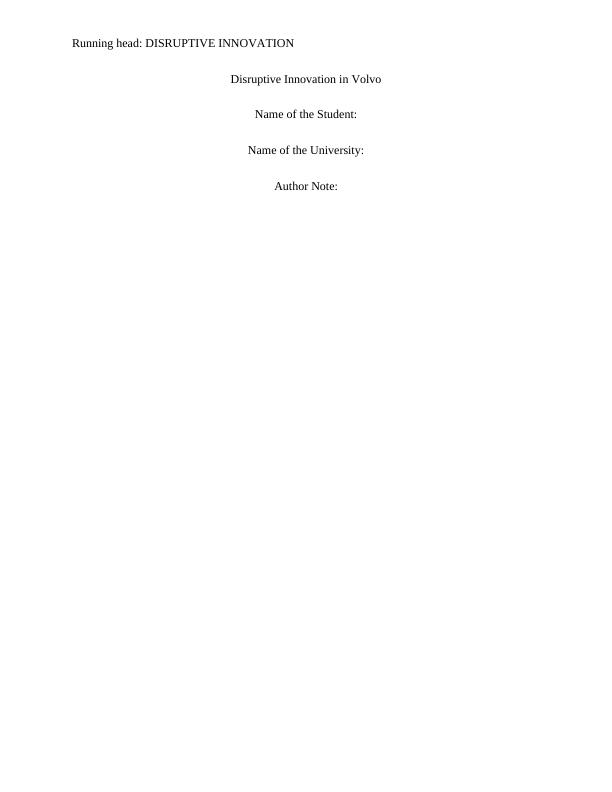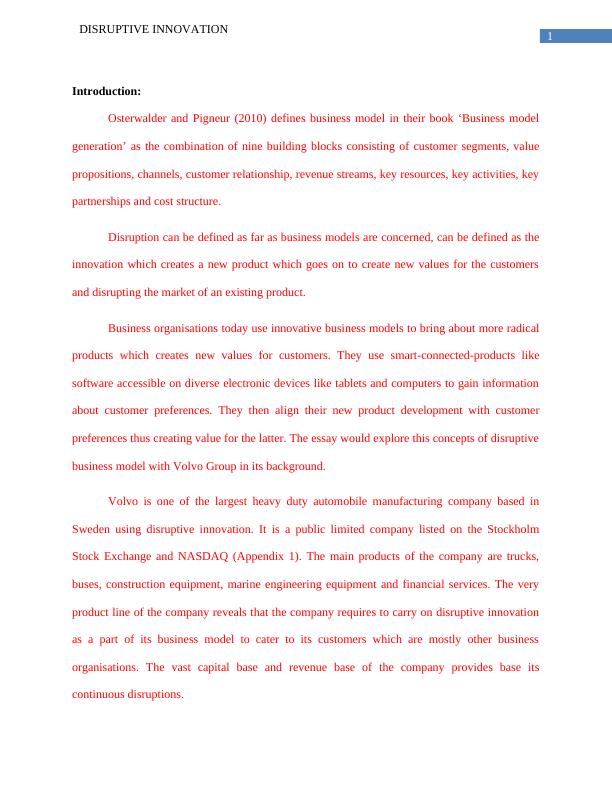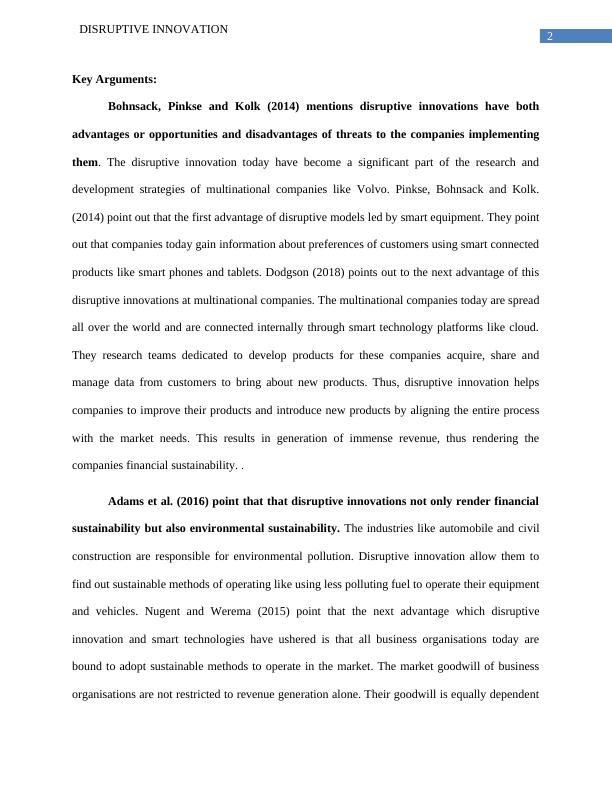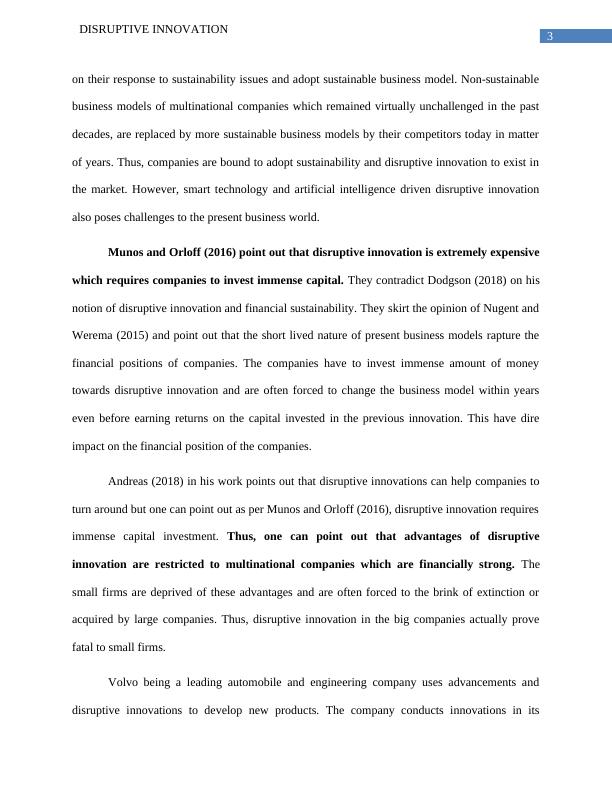Disruptive Innovation in Volvo
Added on 2023-06-13
11 Pages2644 Words327 Views
Running head: DISRUPTIVE INNOVATION
Disruptive Innovation in Volvo
Name of the Student:
Name of the University:
Author Note:
Disruptive Innovation in Volvo
Name of the Student:
Name of the University:
Author Note:

1
DISRUPTIVE INNOVATION
Introduction:
Osterwalder and Pigneur (2010) defines business model in their book ‘Business model
generation’ as the combination of nine building blocks consisting of customer segments, value
propositions, channels, customer relationship, revenue streams, key resources, key activities, key
partnerships and cost structure.
Disruption can be defined as far as business models are concerned, can be defined as the
innovation which creates a new product which goes on to create new values for the customers
and disrupting the market of an existing product.
Business organisations today use innovative business models to bring about more radical
products which creates new values for customers. They use smart-connected-products like
software accessible on diverse electronic devices like tablets and computers to gain information
about customer preferences. They then align their new product development with customer
preferences thus creating value for the latter. The essay would explore this concepts of disruptive
business model with Volvo Group in its background.
Volvo is one of the largest heavy duty automobile manufacturing company based in
Sweden using disruptive innovation. It is a public limited company listed on the Stockholm
Stock Exchange and NASDAQ (Appendix 1). The main products of the company are trucks,
buses, construction equipment, marine engineering equipment and financial services. The very
product line of the company reveals that the company requires to carry on disruptive innovation
as a part of its business model to cater to its customers which are mostly other business
organisations. The vast capital base and revenue base of the company provides base its
continuous disruptions.
DISRUPTIVE INNOVATION
Introduction:
Osterwalder and Pigneur (2010) defines business model in their book ‘Business model
generation’ as the combination of nine building blocks consisting of customer segments, value
propositions, channels, customer relationship, revenue streams, key resources, key activities, key
partnerships and cost structure.
Disruption can be defined as far as business models are concerned, can be defined as the
innovation which creates a new product which goes on to create new values for the customers
and disrupting the market of an existing product.
Business organisations today use innovative business models to bring about more radical
products which creates new values for customers. They use smart-connected-products like
software accessible on diverse electronic devices like tablets and computers to gain information
about customer preferences. They then align their new product development with customer
preferences thus creating value for the latter. The essay would explore this concepts of disruptive
business model with Volvo Group in its background.
Volvo is one of the largest heavy duty automobile manufacturing company based in
Sweden using disruptive innovation. It is a public limited company listed on the Stockholm
Stock Exchange and NASDAQ (Appendix 1). The main products of the company are trucks,
buses, construction equipment, marine engineering equipment and financial services. The very
product line of the company reveals that the company requires to carry on disruptive innovation
as a part of its business model to cater to its customers which are mostly other business
organisations. The vast capital base and revenue base of the company provides base its
continuous disruptions.

2
DISRUPTIVE INNOVATION
Key Arguments:
Bohnsack, Pinkse and Kolk (2014) mentions disruptive innovations have both
advantages or opportunities and disadvantages of threats to the companies implementing
them. The disruptive innovation today have become a significant part of the research and
development strategies of multinational companies like Volvo. Pinkse, Bohnsack and Kolk.
(2014) point out that the first advantage of disruptive models led by smart equipment. They point
out that companies today gain information about preferences of customers using smart connected
products like smart phones and tablets. Dodgson (2018) points out to the next advantage of this
disruptive innovations at multinational companies. The multinational companies today are spread
all over the world and are connected internally through smart technology platforms like cloud.
They research teams dedicated to develop products for these companies acquire, share and
manage data from customers to bring about new products. Thus, disruptive innovation helps
companies to improve their products and introduce new products by aligning the entire process
with the market needs. This results in generation of immense revenue, thus rendering the
companies financial sustainability. .
Adams et al. (2016) point that that disruptive innovations not only render financial
sustainability but also environmental sustainability. The industries like automobile and civil
construction are responsible for environmental pollution. Disruptive innovation allow them to
find out sustainable methods of operating like using less polluting fuel to operate their equipment
and vehicles. Nugent and Werema (2015) point that the next advantage which disruptive
innovation and smart technologies have ushered is that all business organisations today are
bound to adopt sustainable methods to operate in the market. The market goodwill of business
organisations are not restricted to revenue generation alone. Their goodwill is equally dependent
DISRUPTIVE INNOVATION
Key Arguments:
Bohnsack, Pinkse and Kolk (2014) mentions disruptive innovations have both
advantages or opportunities and disadvantages of threats to the companies implementing
them. The disruptive innovation today have become a significant part of the research and
development strategies of multinational companies like Volvo. Pinkse, Bohnsack and Kolk.
(2014) point out that the first advantage of disruptive models led by smart equipment. They point
out that companies today gain information about preferences of customers using smart connected
products like smart phones and tablets. Dodgson (2018) points out to the next advantage of this
disruptive innovations at multinational companies. The multinational companies today are spread
all over the world and are connected internally through smart technology platforms like cloud.
They research teams dedicated to develop products for these companies acquire, share and
manage data from customers to bring about new products. Thus, disruptive innovation helps
companies to improve their products and introduce new products by aligning the entire process
with the market needs. This results in generation of immense revenue, thus rendering the
companies financial sustainability. .
Adams et al. (2016) point that that disruptive innovations not only render financial
sustainability but also environmental sustainability. The industries like automobile and civil
construction are responsible for environmental pollution. Disruptive innovation allow them to
find out sustainable methods of operating like using less polluting fuel to operate their equipment
and vehicles. Nugent and Werema (2015) point that the next advantage which disruptive
innovation and smart technologies have ushered is that all business organisations today are
bound to adopt sustainable methods to operate in the market. The market goodwill of business
organisations are not restricted to revenue generation alone. Their goodwill is equally dependent

3
DISRUPTIVE INNOVATION
on their response to sustainability issues and adopt sustainable business model. Non-sustainable
business models of multinational companies which remained virtually unchallenged in the past
decades, are replaced by more sustainable business models by their competitors today in matter
of years. Thus, companies are bound to adopt sustainability and disruptive innovation to exist in
the market. However, smart technology and artificial intelligence driven disruptive innovation
also poses challenges to the present business world.
Munos and Orloff (2016) point out that disruptive innovation is extremely expensive
which requires companies to invest immense capital. They contradict Dodgson (2018) on his
notion of disruptive innovation and financial sustainability. They skirt the opinion of Nugent and
Werema (2015) and point out that the short lived nature of present business models rapture the
financial positions of companies. The companies have to invest immense amount of money
towards disruptive innovation and are often forced to change the business model within years
even before earning returns on the capital invested in the previous innovation. This have dire
impact on the financial position of the companies.
Andreas (2018) in his work points out that disruptive innovations can help companies to
turn around but one can point out as per Munos and Orloff (2016), disruptive innovation requires
immense capital investment. Thus, one can point out that advantages of disruptive
innovation are restricted to multinational companies which are financially strong. The
small firms are deprived of these advantages and are often forced to the brink of extinction or
acquired by large companies. Thus, disruptive innovation in the big companies actually prove
fatal to small firms.
Volvo being a leading automobile and engineering company uses advancements and
disruptive innovations to develop new products. The company conducts innovations in its
DISRUPTIVE INNOVATION
on their response to sustainability issues and adopt sustainable business model. Non-sustainable
business models of multinational companies which remained virtually unchallenged in the past
decades, are replaced by more sustainable business models by their competitors today in matter
of years. Thus, companies are bound to adopt sustainability and disruptive innovation to exist in
the market. However, smart technology and artificial intelligence driven disruptive innovation
also poses challenges to the present business world.
Munos and Orloff (2016) point out that disruptive innovation is extremely expensive
which requires companies to invest immense capital. They contradict Dodgson (2018) on his
notion of disruptive innovation and financial sustainability. They skirt the opinion of Nugent and
Werema (2015) and point out that the short lived nature of present business models rapture the
financial positions of companies. The companies have to invest immense amount of money
towards disruptive innovation and are often forced to change the business model within years
even before earning returns on the capital invested in the previous innovation. This have dire
impact on the financial position of the companies.
Andreas (2018) in his work points out that disruptive innovations can help companies to
turn around but one can point out as per Munos and Orloff (2016), disruptive innovation requires
immense capital investment. Thus, one can point out that advantages of disruptive
innovation are restricted to multinational companies which are financially strong. The
small firms are deprived of these advantages and are often forced to the brink of extinction or
acquired by large companies. Thus, disruptive innovation in the big companies actually prove
fatal to small firms.
Volvo being a leading automobile and engineering company uses advancements and
disruptive innovations to develop new products. The company conducts innovations in its

End of preview
Want to access all the pages? Upload your documents or become a member.
Related Documents
Disruptive Innovation and New Product Development at Volvolg...
|11
|375
|119
Opportunities and Threats of Smart Connected Products for Volvo's Business Modellg...
|9
|2217
|386
Operations and Management assignment : Kia Motorslg...
|12
|3161
|576
Innovation and Sustainable Business Development - Volvo Group, Swedenlg...
|8
|667
|227
Marketing Strategy for Portable Electronic Bikelg...
|4
|708
|274
Business Model and Disruptionlg...
|10
|2589
|334